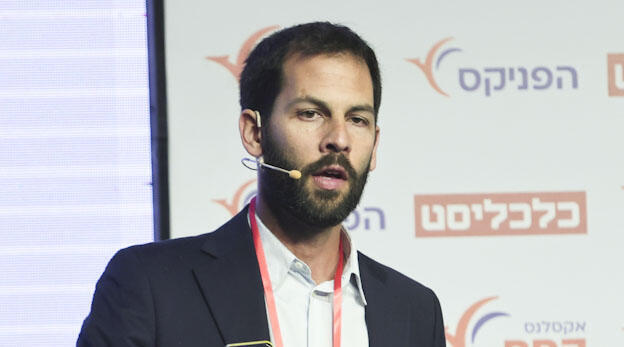
ISRAEL AT WAR
Israel’s post-war economic roller coaster: Recession, then rebound
Economist Amir Kahanovich predicts that the Israeli economy will enter a recession following the war but that there will be an economic rebound. "Now there is a standstill, but past experience shows that it is temporary"
The war in Gaza, which could last for many weeks, and the fear of economic stagnation has led the capital market to predict that we are on the verge of economic relief. Currently, the expectation is for monetary relief such as lowering interest rates and fiscal relief such as the distribution of compensation to companies by the Ministry of Finance.
These expenses may not be enough to prevent the economy from entering a recession, but they should also lead to a significant economic rebound afterward. At least that's what Amir Kahanovich, chief economist at Profit and former chief economist of Phoenix-Excellence believes. "When I look at similar events, that is, those that required the intervention of the Bank of Israel and the government, and when I add to the fact that there will also be assistance from the American government and Diaspora Jews, I know that what is brewing now will turn into a flood in a few months," he predicts.
Kahanovich explains that the dynamics of crises are quite similar: the capital market will suffer in the near future, but with the exit from the war, financial liquidity will be created that will push the markets. "At the moment, everyone is afraid and there are declines in the capital market. In the first stage, the government is paralyzed but they are in a frenzy to spend and quickly. Everyone wants to spend money and soon everyone will be in favor of this. In the second stage, we will see piles of money flowing in all directions," he says.
Kahanovich does not believe that the government's actions will be able to significantly curb the economic consequences of the war in Gaza. According to him, "Even if the most sympathetic government comes, that is, one that wants to pour huge amounts of money into the economy, it will be very difficult for it to pour money quickly and efficiently. After all, every decision has to go through tenders and committees. We are only in the second week of the fighting, so it is difficult to determine what those steps will be. But we have to admit that the governments are ineffective. Even if they wanted to help, they wouldn't know who to transfer money to."
"We saw it happen during the pandemic," he points out. "After a period of some frustration, the governments in the U.S. and Israel decided that they did not know who to transfer the money to in order to stimulate the economy, so they distributed it to everyone, even though such a step draws a lot of criticism for inefficient and ill-considered spending."
Another option for the government is to bring the economy out of recession by itself through initiated works, but according to Kahanovich this option is also impractical: "They say build bridges, but it takes ten years until the money is paid. Everything is too slow. The Americans want to help Israel, both economically, as well as militarily, but even with them it takes a long time. However, it's worth remembering that in the end all these funds will be flowing in. It's a matter of time."
Crises have a similar dynamic, why haven't we seen increases in the stock market?
"The stock market is affected by two figures: the expectation regarding company profits and the interest rate. We are facing two very big question marks regarding both. Regarding the profitability of the companies, today nobody buys, spends, or flies. After the exit from the crisis there is a rebound. With the pandemic it took a year. In the first stage there is paralysis. In many companies the employees are not present and they are not working at full capacity. But we learned that this is temporary and that after such events there is compensation.
"Governments are ineffective and who will come to the rescue in the end? The Bank of Israel," says Kahanovich. "At the moment the governor is still cautious, but the Bank of Israel announced that it is selling foreign currency reserves and is supposed to provide liquidity to institutions. We are not far off from hearing claims like 'The interest rate is suffocating us, don't you want to help in the war effort?', or 'The state needs to raise funds and start lowering the interest rate'. At some point the citizens will feel that they have no money, in the short or long term, and the pressure on the Bank of Israel to lower the interest rate will increase."
Related articles:
Is there a fear that the dollar will climb to significant heights with the lowering of the interest rate, after it has already crossed the barrier of 4 shekels?
"As soon as the insurance companies start receiving claims following the damage caused by the war - and many of these claims are paid abroad by reinsurers - dollars will start flowing into Israel. This also happened in the nuclear explosion in Japan. The yen in Japan soared at the time, and this was misunderstood as the economy was damaged. But the reparations of the disaster led to the flow of a lot of foreign currency into the country."
What would you suggest to investors?
"A lot of things are going to happen here economically, but it is never right to run away from the market. You have to come to such events with a balanced portfolio. Fortunately, most of us are balanced. We must not forget that all the institutions in Israel invest abroad to begin with, and therefore all the investment portfolios here, in view of the damage to the local economy , are quite balanced. In recent years, the institutions have made many diversions abroad because of the problems in Israel and now, in a time of crisis, these moves protect the savers. I often hear that spending money abroad is an un-Zionist act, but it is good for the country that the citizens are financially stable. They pay taxes after all. It is not desirable for the country that the citizens are at financial risk."
This week Kahanovich began his role as the chief economist of Profit, the largest independent insurance agency in Israel that manages assets of around NIS 50 billion. Before that, he served as the chief economist of Phoenix, the insurance company with the largest volume of managed assets in Israel - more than NIS 300 billion.
How was your first week at your new job?
"The whole market is at a standstill. You can see it in the trading cycles. Everyone is with their children, worrying about the state of the country and fearing the military scenarios, and not worrying about finances."
